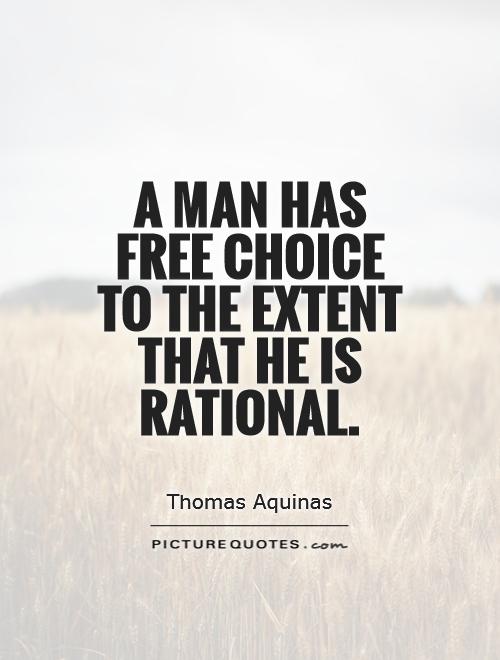A man has free choice to the extent that he is rational

A man has free choice to the extent that he is rational
Thomas Aquinas, a prominent theologian and philosopher of the medieval period, believed that human beings possess free will to the extent that they are rational. This concept is central to Aquinas' understanding of human nature and the relationship between reason and freedom.According to Aquinas, human beings are unique among all creatures in that they possess the capacity for rational thought. This rationality allows individuals to make choices based on reason and to act in accordance with their own will. In other words, human beings have the ability to deliberate, weigh options, and make decisions that are not determined by external forces.
However, Aquinas also believed that true freedom is not simply the ability to choose between different options, but the ability to choose what is good and in accordance with reason. For Aquinas, the ultimate goal of human life is to seek the good, which is defined as that which is in accordance with reason and leads to human flourishing. Therefore, true freedom is not the ability to do whatever one pleases, but the ability to choose what is truly good and beneficial for oneself and others.
Aquinas' understanding of free will as being tied to rationality has important implications for moral philosophy. If human beings are rational creatures, then they have the ability to discern right from wrong and to choose to act in accordance with moral principles. This means that individuals are responsible for their actions and can be held accountable for their choices.
Furthermore, Aquinas believed that reason is a gift from God and that it is through the exercise of reason that human beings can come to know and understand the divine will. Therefore, for Aquinas, rationality is not only a means of making choices, but also a means of coming closer to God and fulfilling one's ultimate purpose in life.












 Friendship Quotes
Friendship Quotes Love Quotes
Love Quotes Life Quotes
Life Quotes Funny Quotes
Funny Quotes Motivational Quotes
Motivational Quotes Inspirational Quotes
Inspirational Quotes